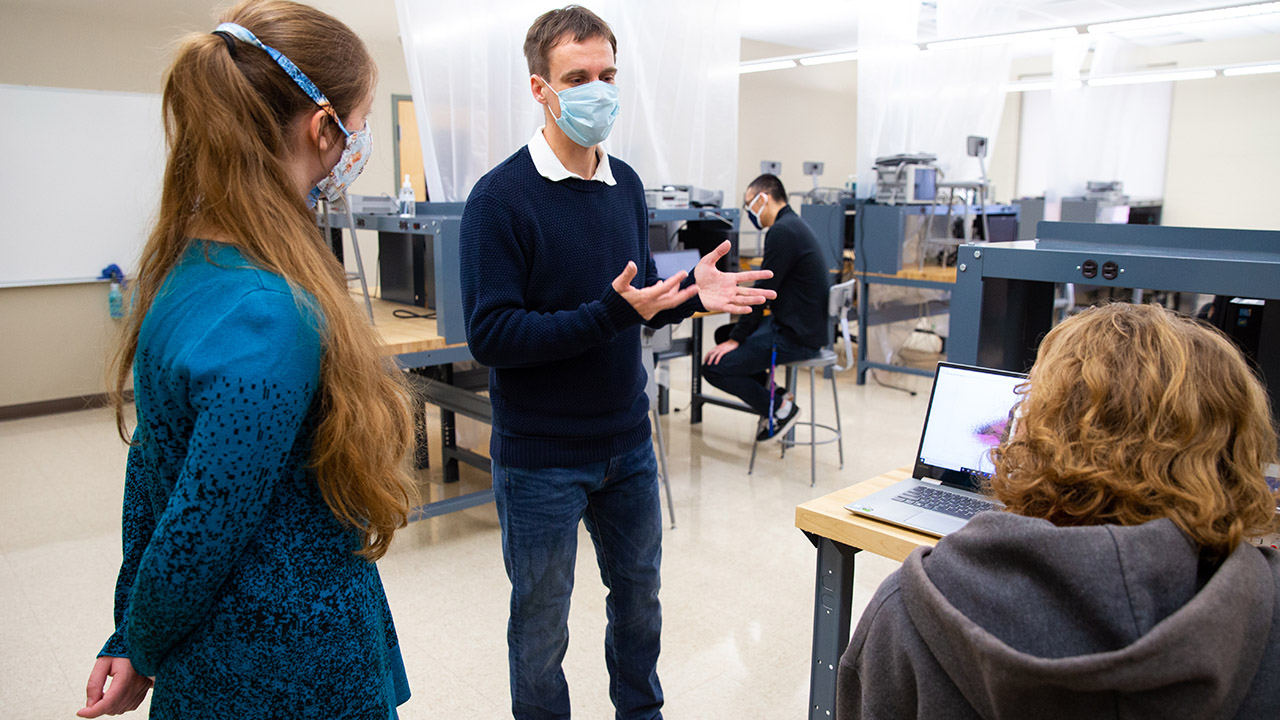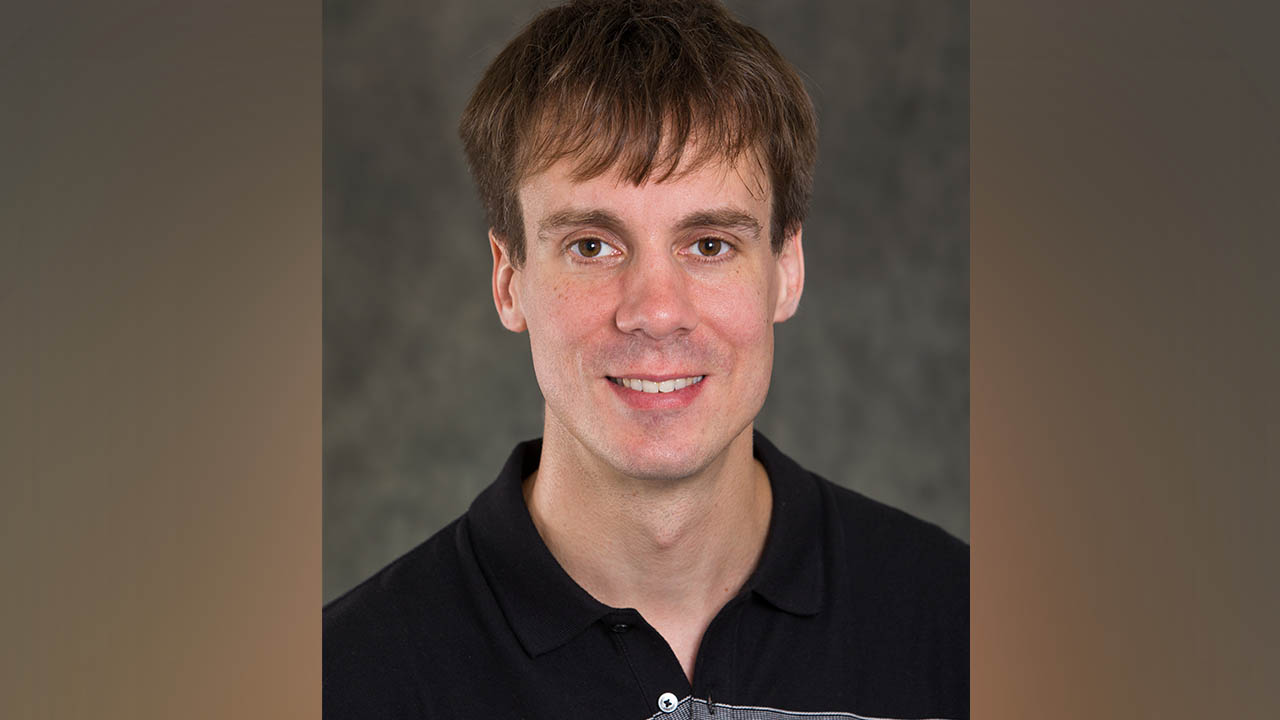

Since joining UW-Platteville in 2015, Dr. Hynek Boril, assistant professor of electrical and computer engineering, has been instrumental in providing students with unique research opportunities on campus, particularly through his creation of the Pioneer Speech Signal Processing Laboratory.
Boril earned both a master’s degree in electrical engineering and a Ph.D. in electrical engineering and information technology from Czech Technical University in Prague. He then started a position as a research associate at the University of Texas at Dallas, in the Center for Robust Speech Systems. There, he met his future wife, Dr. Yan Shi, who was completing her Ph.D. at UT-Dallas at the time. After graduation, Shi found a tenure-track position at UW-Platteville, and she is now an associate professor of computer science and software engineering.
“As time went by, I could see Yan was truly enjoying her work at UW-Platteville,” said Boril. “I heard from Yan’s colleagues about the Electrical Engineering Department having a great reputation with industry, with a 100% placement of their graduates in tri-state area tech companies. In 2015, I heard that there was an opening for a tenure-track position in the computer engineering emphasis of the Electrical Engineering program. I applied and got lucky enough to get the job.”
How did you become interested in the field of speech technologies?
I was originally interested in music signal processing, and my master’s thesis was on real-time guitar-to-MIDI conversion. The convertor turns an electric guitar into a MIDI –Musical Interface Digital Interface controller – you pluck strings, the convertor analyzes acoustic signals from a divided guitar pickup and extracts information about the notes being played and their velocities. This information is transformed into a MIDI format and can be used to trigger a music synthesizer in a real time. So, while we are playing a guitar, the audience may hear the sound of a piano, strings, or a church organ. This was not a new concept, and there were several commercial products available on the market at that time, but they were prohibitively expensive and their note tracking was lagging and inaccurate, making their use in live performances quite limited. I had some ideas on increasing the speed and accuracy of existing tracking techniques and so my thesis defense was accompanied by fierce church organ solos played on a six-string guitar.
There were no funded projects in music processing in the Ph.D. track at my university, but several professors worked on automatic voice recognition. During my master’s, I took several courses that dealt with voice analysis and modeling and heard that pitch tracking in spoken speech was a thing, so I decided to try my luck and enrolled. Magically, the tracking algorithm from my MIDI converter worked surprisingly well also on speech signals and so my first paper on automatic pitch tracking in human voice was just that. Soon after, my focus moved from pitch tracking to automatic speech recognition in adverse acoustic environments, which also became my dissertation topic.
After completing my Ph.D., I moved to the Center for Robust Speech Systems at The University of Texas at Dallas and worked on speech recognition, speaker/language/dialect recognition, emotion classification and analysis of language acquisition in infants.
You established the Pioneer Speech Signal Processing Laboratory at UW-Platteville; what are the goals of this lab?
When joining the ECE department, I was aware that UW-Platteville was primarily a teaching institution. I had a previous teaching experience from my Ph.D. studies, but at UT-Dallas, besides giving occasional guest lectures, I was almost exclusively focused on research. So, I was excited to finally have an opportunity to design and teach full courses and interact with students in the classroom on a regular basis. At the same time, I did not want to give up my passion for research, and I wanted to share it with my students. I learned that there was an option to offer Independent Studies, where I could work with interested students on a variety of topics. During my second semester here, I received the EMS Start-Up Fund and used a portion of it to buy some equipment and hire three students to work with me. Soon the word spread, and I ended up with eight students doing independent studies that same semester. Since then, I have been working with eight to 14 students each semester.
I decided to establish the Pioneer Speech Signal Processing Laboratory to serve as an umbrella for these undergraduate research efforts. One of the goals of PSSPL is to introduce our students to undergraduate research in the areas of digital signal processing and machine learning with applications in speech technologies. Another goal is to raise awareness of our students about graduate programs at research universities and letting them know that this is certainly a viable option for many of them.
PSSPL received a generous support from various sources across the campus. Thanks to this support, we were able to bring, annually, a group of PSSPL students to present their research projects to our partnering laboratory – the Center for Robust Speech Systems at UT-Dallas, get them exposed to the local graduate research programs, and engage them with local faculty who would give us tours through their labs and offer round-table discussions and one-on-one meetings. These on-site visits at UT-Dallas have proven to be life-changing for many of my students. While most were quite set on joining industry right after graduation from UW-Platteville, touring the graduate research labs, having the opportunity to talk with the professors in person and seeing their high-impact projects that generate technological breakthroughs and directly affect the quality of life of the society made many rethink their future path. By now, 13 of PSSPL alumni went on to pursue their future careers in graduate programs at various research universities – 10 are in Ph.D. programs with full support and three in master’s programs. Our alumni are not only successful in joining graduate programs but as a matter of fact, they excel in those. Some of our graduates successfully published their first research papers in top international conferences within the first year of their Ph.D. studies, others received the most competitive scholarship awards and yet others have been recognized with the best teaching assistant awards.
What do you enjoy most about teaching at UW-Platteville?
Coming originally from Europe and being used to the international community at UT-Dallas, I was not sure how I would “blend-in” with the mostly homogeneous student demographics in Platteville. To my relief, the students at UW-Platteville have been very accepting and a lot of fun. Having had the opportunity to interact with students in Europe, Asia and the U.S., I truly appreciate the determination, directness and sincerity of the UW-Platteville students. I realize that not all classes are everybody’s favorites and sometimes getting through may be a struggle. I appreciate students for whom the course material is a breeze as well as those who need to put in an extra effort to pass. It was at UW-Platteville where I first heard a student say, “I didn’t do well on this test. I know I should have studied more.” I was surprised by that directness and sincerity. We cannot always ace everything in our lives, but being direct and sincere is the best foundation for making progress and bettering ourselves.
Your students have gone on to work on significant projects and pursue Ph.D.s What role do you think their experience doing research as undergraduates helped to play in this, and why is this undergraduate research experience so important?
Seeing our students taking the next step in their careers and being successful is the most rewarding experience – be it them landing an industry position they dreamed about or going to a graduate school and working on high-impact projects. Our graduates are known to excel in industry and so we can hear numerous success stories from our alumni working in companies. This clearly validates our programs at UW-Platteville. On the other hand, perhaps due to the high accessibility of good-paying engineering jobs for our graduates, it is much rarer to see applications to graduate schools. So, it feels quite exciting when I learn that some of my students decided to pursue graduate studies. And it gets even more exciting when they work on topics they truly enjoy and do well.
Currently, the PSSPL alumni have been working on a variety of projects such as digitization and processing of NASA Apollo 11 mission communications, development of signal pre-processing strategies for cochlear implant and hearing aid users, physiological signals monitoring and location tracking for patients in healthcare settings, design of trusted integrated circuit architectures, nanosystem control, multimodal – audio and video – speech and emotion recognition and drone grids.
I believe undergraduate research creates a new experience for students, an experience that is quite different from the routine of taking and passing classes. In research, we have a lot of freedom in choosing the aspects and depth in which we want to study a problem. And often, we need to first formulate the problem ourselves – find the white space on the map and try filling it with something meaningful. The process reminds me of digging for gold. And once you find one nugget, you just want to find another one. It is a highly addictive process. In my experience from PSSPL, if a student experiences this process and develops this form of addiction, they are likely to be successful in a graduate school. The rest is just work and patience.
What research are you and your students currently working on that you’re most excited about?
The past decade has seen an emergence of a new paradigm in machine learning called deep neural networks (DNN). Deep neural networks became popular in a large variety of application domains from computer vision to machine translation and speech recognition. My focus is on speech technologies and my students and I are currently exploring DNN-based strategies for automatic acoustic event/speech classification. Our studies involve a relatively new concept of transforming a one-dimensional acoustic signal into a two-dimensional, image-like domain. In this new domain, we can combine traditional and novel image processing strategies to extract information from the acoustic signal such as the speaker’s gender, identity or emotional state. This research combines two aspects – algorithm design and computing solutions. So besides studying various signal representation and classification strategies, my students need to also focus on the implementation and computational aspects. They are learning to work in Linux, programming in Python and using Graphics Processing Units for training neural networks. And since there is a constant development in all these areas and my students are fast in figuring new things out, I am also learning from them, which is exciting.